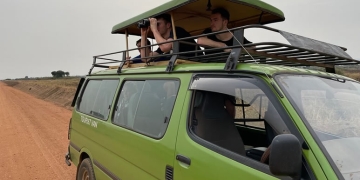
U.S.-based Air Serv, which provides humanitarian aviation services in Africa, has added a Redbird CRV-S flight simulator to its groundbreaking training program for pilots in Uganda.
The flight sim is at Air Serv’s offices in Entebbe, where the non-profit organization has established a pilot training facility.
“This is a big milestone for the aviation industry in Uganda,” said Fred Bamwesigye, Director General of the Uganda Civil Aviation Authority, who noted the simulator was the “first of its kind in Uganda.”
“It will increase the country’s technical skills, which are badly lagging due to a set of technical people who are aging, with fewer new ones qualifying due to the high cost of training,” he added.
Founded in 1984, Air Serv was developed to provide air transportation to humanitarian agencies operating in hard to reach areas. In 1997, a permanent operations base was established at Entebbe Airport, which included an expansion in the services offered, including aircraft maintenance, freight forwarding, hangar and ramp facilities, and consulting.
Over the years, Air Serv’s mission in Uganda has grown to “supporting and contributing to the continent’s blossoming aviation industry,” according to officials.
“Considered by the International Air Transport Association to be one of the fastest growing aviation regions within the next 20 years, Africa is projected to have an annual industry expansion rate of 5%,” Air Serv officials noted. “But with this advancement comes accompanying challenges and obstacles, especially as industry growth outpaces labor capacity. Limited training facilities, high tuition costs, and long-term impacts of the COVID-19 pandemic are resulting in smaller candidate pools of qualified pilots and engineers, particularly in countries such as Uganda where a quickly growing aviation sector is creating an equally demanding need for trained professionals.”
Noting it is “uniquely positioned to address this need,” Air Serv stepped forward.
While it has long provided informal internship opportunities to local students and internal training to staff, the organization recognized a growing need for formalized, hands-on training to meet pilot licensing requirements.
Funded by a grant from the Hilton Foundation, Air Serv developed a structured training program that combines classroom training, virtual education through its own online portal, and on-the-job experience. The program, supporting regional flight schools through the provision of supplemental education and experiential learning, also aims to generate interest in aeronautics, provide more opportunities for female students, and contribute to the region’s workforce, officials said.
With the inaugural class currently in session, future participants will be selected from a growing list of applicants. Selected students will be provided transportation and meals in addition to their education and training.
“The addition of the flight simulator will be a game changer for the region’s pilots who need to build required time,” Air Serv officials said.
In addition to its own training program, Air Serv intends to offer access to the simulator to local flight schools, private pilots, and fellow air service providers on an hourly rental basis.
Air Serv’s Cessna Caravan flight simulator is the first in the country to be made publicly available to student and civilian pilots, officials said, noting flight hours obtained on the sim will count towards a Caravan type rating.
The introduction of the sim “will create a safe, economical, and accessible opportunity for pilots who may have never been able to complete their training otherwise,” officials add.
















